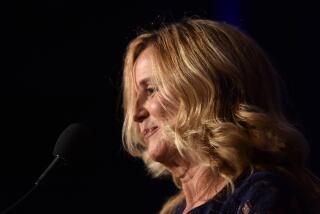Op-Ed: Mary Karr: How writers dig up the past
When I think of all the stiff pronouncements I’ve made demanding truth in memoir, I’m inclined to hang my head. Nobody elected me the boss of memoir. I am not the art police. Whether you’re Philip Roth hiding behind the fig leaf of fiction or Pam Houston claiming her novels and memoirs are both 82% true, that’s up to your conscience. One of the great perks of what Stephen Colbert calls the “truthiness” of our era is that any artist can cut her own deal with the reader vis-a-vis veracity. As a writer, I defend that freedom.
But as a reader, it rankles me to be promised fact and given fiction; and I worry the falsifiers will lead audiences to believe, wrongly, that all memoirists make stuff up as they go along.
Hearing that the alleged Holocaust survivor whose book I blurbed actually spent the war comfortably in Switzerland (and wasn’t even Jewish), I felt like a chump. James Frey had no problem stating on national television that his manufacturing of jail time and fistfights with cops was the kind of common fiction any nonfiction writer might indulge in. Not among the great memoirists I’ve known.
In fact, making up events that never went down is not common, except among those intent on faking out the public. What’s common? Changing names or blurring a few details to protect the innocent, reconstructing dialogue to the best of your ability or telescoping time to spare readers the dull parts; those are standard.
Most of the writers I know approach memoir out of some agonizing need to make sense of a troubled past. Kathryn Harrison undertook “The Kiss” only after she’d written the story of her father’s incest in novel form more than once. Later, she felt those fictions rendered a more innocent daughter than she had in fact been. Those “lies” had haunted her as yet another sort of complicity with her abuser. For her to falsify events — after years in analysis dealing with the psychological fallout — would’ve kept her tethered to the tale longer and defeated part of the book’s purpose.
The same holds true for me. Having grown up in a hard-drinking family, I was lied to often and with conviction, starting with the phrase “I’m not drunk.” The family’s tendency to say “Everything’s fine” when my mother was wagging a firearm at her latest husband quite literally made me crazy. Sorting out the truth from apocrypha and family myth became a lifelong mission, and I’d been in therapy for more than a decade when I undertook the story in a novel.
Believe me, a novel is a more lofty form, and I’d have preferred to succeed with it. But writers can’t choose which genre suits them best. For me, fiction was an excuse to make the little girl me far more beautiful and noble and wise than I’d in fact been. I was a biter; I shot a BB gun at a neighbor kid. None of that happened in my crummy novel.
Only working in nonfiction forced me to think and rethink and gnaw and ponder and wonder as fully as I needed to.
After a book’s done, I routinely send pages out to family and dozens of friends and shrinks and teachers and bystanders because I don’t fully trust my own memories. Exaggeration might be standard in informal settings — in private wrangles with family at Thanksgiving over what happened when, say. But it takes a whole new level of sociopathy to publish a book that knowingly gins out falsehoods, then to slap “nonfiction” on the label.
Yes, memory fails. You remember an event as having happened at Christmas, yet the photos show you in shirt sleeves on July 4th. So you correct yourself. I always say unless you’re a worrier and a nail-biter — a re-thinker — memoir might not be your playpen because you usually have to scratch and scrabble for the harder truths. Writing “Lit,” I broke the delete key off my keyboard.
My friends and family have been generous in signing off on all three of my memoirs. But I also try to be generous to anybody I render. Mostly I write out of love. (If you want revenge, hire a lawyer.) I try not to use simplistic labels; they’re reductive. So I never called my parents alcoholics. I showed the child me upending vodka bottles down the sink. I don’t guess at people’s motives, because I only know my own. In fact, my biggest enemy in all my books, as in life, is my own mind.
If a memoirist transcribes her mind so its edges show — admitting what she can’t recall instead of fabricating, showing herself as she fumbles through memories — she constantly reminds the reader that this is a personal take on the past. Today’s reader understands that memories don’t pop out of a pristine file drawer. Great memoirs don’t read as journalism or objective fact. The writer’s psyche stays on display.
In a New York Times review — a pretty good one, by the way, of my recent “The Art of Memoir” — Janet Maslin claims that I urge memoirists to “fudge details.” For evidence, she cites the line “Surely I misremember all kinds of stuff.” I note that the boy I kissed who was chewing Juicy Fruit in memory was perhaps partial to another brand in fact. Forget that he signed off on the Juicy Fruit. I’m saying we could both be wrong.
But I don’t fault Maslin. She’s just parroting the standard wisdom that memoirists are avowed fabulists. The best ones are wrestling with memory as we all do, trying to make sense of our messy, complicated lives.
Mary Karr is the author, most recently, of “The Art of Memoir.”
Follow the Opinion section on Twitter @latimesopinion and Facebook
More to Read
A cure for the common opinion
Get thought-provoking perspectives with our weekly newsletter.
You may occasionally receive promotional content from the Los Angeles Times.






